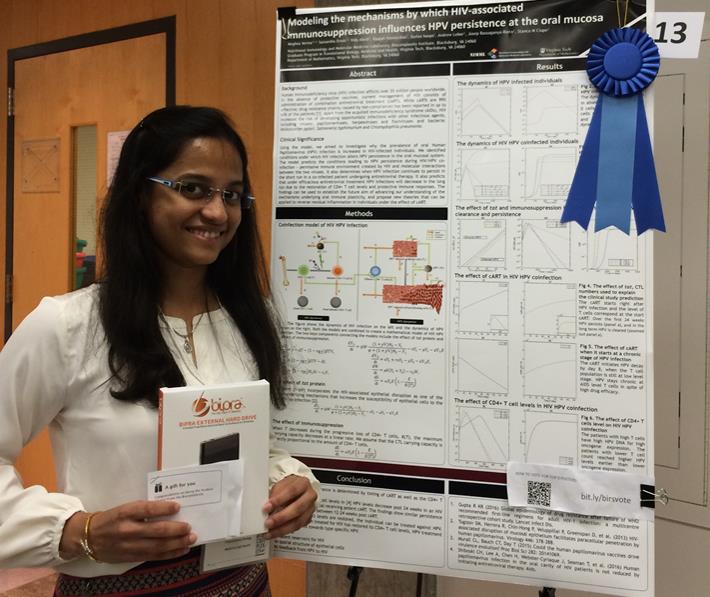Meghna Verma, a NIMML PhD Student, Wins the Biocomplexity Institute Poster Competition

November 1, 2016, Blacksburg, VA – The Biocomplexity Institute of Virginia Tech announced Meghna Verma, a graduate student at Nutritional Immunology and Molecular Medicine Laboratory (NIMML), as one of the top awardees in the poster presentation session, at the Biocomplexity Institute’s 2016 Research Symposium. The Biocomplexity Institute’s 2016 Research Symposium held on November 1, 2016 at Virginia Tech, was an event open to all science enthusiasts from different backgrounds ranging from immunology, public health, computer science, mathematics and physics.
Meghna Verma, is a third year graduate student in the Translational Biology, Medicine and Health program working under the guidance of Dr. Josep Bassaganya-Riera, director of NIMML and Dr. Raquel Hontecillas, co-director of NIMML. She earned her Masters in Biomedical Engineering and Bioinformatics from Drexel University, Philadelphia in 2014, and joined the NIMML in August 2015. Her current graduate work focuses on the use of mathematical and computational models aimed to study infectious diseases including Helicobacter pylori, Human Immunodeficiency virus (HIV) and Human Papillomavirus (HPV) infection and immune medicated diseases such as inflammatory bowel disease (IBD).
The poster entitled “Modeling the mechanisms by which HIV-associated immunosuppression influences HPV persistence at the oral mucosa” was displayed in Phase I of the Biocomplexity Institute in the poster presentation session on Tuesday, November 1, 2016 from 4pm to 6pm. The poster abstracts are available here.
“We are excited to be recognized as one of the top awardees at the Research symposium today,”, said Meghna Verma. “The manuscript for the work that I presented is currently under review. The work is focused on the use of mechanistic models to study the HIV- HPV coinfection, where in we investigate the right time to deliver the combined antiretroviral treatment, to a HIV-HPV co-infected patient.”
“I am proud to see that the NIMML team continues to be at the forefront of using modeling approaches as an alternative mode of investigation in the study of infectious and immune medicated diseases”, said Dr. Bassaganya-Riera. “The work presented by Meghna represents an example of a productive collaboration with Dr. Stanca Ciupe, an Associate Professor at the Department of Mathematics. Projects such as this one illustrate the unrelenting commitment of the NIMML for applying team science approaches to solve important public health problems.”
“This year’s BI symposium was a great success. By combining panel discussions and a posters session we have been able to highlight the whole scope of world-class research going on at Virginia Tech and BI,” said Dr. Hontecillas, the co-director of NIMML. “Meghna’s work is another example of how the power of computational modeling can be applied to address important mechanistic questions in human disease.”
The NIMML researchers have ongoing research collaborations related to infectious, immune-mediated and metabolic disease with faculty across all areas of the Virginia Tech campus, including the College of Veterinary Medicine, the College of Agriculture and Life Sciences and the College of Science.
The Research symposium hosted at the Biocomplexity Institute on the Virginia Tech campus was streamed live online. For more information and access to videos and panel discussion, please visit here.
About NIMML
The NIMML Institute is a 501 (c) (3) non-profit public charity foundation focused on a transdisciplinary, team-science approach to precision medicine at the interface of immunology, inflammation, and metabolism. The NIMML Institute team has led numerous large-scale transdisciplinary projects and is dedicated to solving important societal problems by combining the expertise of immunologists, computational biologists, toxicologists, modelers, translational researchers, and molecular biologists. The Institute is headquartered in Blacksburg, VA. For more information, please visit www.nimml.org or contact pio@nimml.org.
